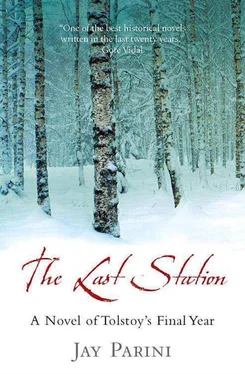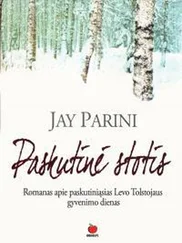When we arrived at the Sukhotins’ – a magnificent house that sits in its own spacious park – Leo Nikolayevich declared that he was going to stay a very long time. ‘I shall love every moment of it: no passersby demanding five-kopeck pieces, no fugitives from the law seeking counsel, no mothers at war with their daughters….’
I do not actually like the hordes of third-rate revolutionaries, fanatics, and fortune hunters who cram the doorway of Yasnaya Polyana each day requesting an interview with ‘the Count.’ That he does not banish them all is to his credit. I do not share this largeness of spirit.
We rested before dinner, which was worth waiting for. So many delicious courses, served on English china! Leo Nikolayevich was animated, talking more than eating. I caught a glimpse of the young, carefree count who, back in the 1850s, had dazzled Parisian society with his wit and knowledge, with the sheer force of his character. Here was the man whom even Ivan Turgenev could not withstand.
On our last visit to Kochety, a drawling, simpering woman who was remarkably undeferential to Russia’s greatest author had said to Leo Nikolayevich, ‘Do try to be kind to my son, since he can’t bear you. Chat about horses – or something that will interest him. Perhaps he then will forgive you for being so eccentric.’
Leo Nikolayevich had grinned and nodded. Later, he claimed that he had enjoyed the woman. ‘Simplicity on such a grand scale is rare. She has a kind of purity I admire.’ I did not, myself, see the purity.
Before retiring, Leo Nikolayevich wanted to walk in the park, alone, to ‘gather his thoughts before sleeping.’
‘I’ll go with you, Papa,’ said Tanya, taking his arm.
‘Let me go alone,’ he said.
Nervously, Tanya agreed.
‘What are you afraid of?’ he asked her. ‘Wolves?’
‘You might stumble.’
‘And the sky might fall!’
She looked mildly sullen.
‘My darling, you worry too much about your poor old father. I have already lived a very long time. There is no need to trouble yourself.’
He walked off, leaning on a cane, into the cool air.
I sat comfortably in the drawing room with a glass of tea on my lap while Sukhotin nattered on about the rights of landowners and government levies.
More than an hour passed without a sign of Leo Nikolayevich, and it was now dark.
‘I suspect that something has gone wrong,’ Tanya said, breaking our conversation at a convenient point. She clasped her hands in front of her chest like a young matron.
‘Not to worry, dear,’ Sukhotin said, growing red in the cheeks – the effect more of brandy than of panic. ‘Let me dispatch servants throughout the park. They will find him.’
He toddled off to the front hall, where he rang a bell that summoned the household staff. He rattled off orders like an old military officer.
‘He has only been gone for an hour,’ I said.
‘He could be dead!’ said Tanya. ‘He might have fallen into the pond!’ She began to sob into a red silk kerchief.
‘He has probably just had a little fainting spell,’ Sukhotin said, entering with the bluff self-assurance of a man of inaction. ‘They’ll find him, I’m sure of it.’
‘He is probably sitting on a bench,’ I said. ‘He wanders around Yasnaya at all hours. This is nothing unusual.’
But they could not hear me.
Bells rang in the distance, and a brass hunting horn was blown. Servants scattered throughout the park, crying, ‘Count Tolstoy!’ in a wild chorus that returned in mingling echoes.
When a good while had passed without results, I became afraid that my cynicism would be shown up. Putting on a cloak against the night chill, I set out myself on the least obvious path to the most desirable place. I knew that the large meadow behind a stand of pines was his most likely goal: Leo Nikolayevich likes to emerge into a clearing from a densely wooded area.
In less than half an hour, I found him. He was sitting on a tree stump, humming a familiar folk melody about an old crow that flies off by itself into a dark wood, never to return.
‘You’ve upset everyone at the house, Leo Nikolayevich.’
‘I have?’
‘Tanya thought you were dead.’
‘She overestimates my good luck.’
I sat beside him on the stump, which was vast and moldering. It was not comfortable.
‘Why did you come looking for me?’
‘They were fussing about you. I was afraid.’
‘You worry too much, Dushan. You must live as though your life does not matter.’
‘It’s your life that matters,’ I said.
‘That’s foolish. I don’t matter in the least. What matters is the lovely air we breathe. Smell it, Dushan.’
I sucked in a breath. Was it lilac?
‘I am enjoying myself tonight,’ he said.
‘You are causing trouble.’
‘Yes, that always pleases me, doesn’t it? A sign of vanity. I must pray about that.’
‘We had better find Tanya,’ I said, taking his arm.
Once we were inside, Tanya scolded her father. ‘You must not go out alone, Papa. Not in the dark.’
He winked at me. ‘All right, all right. And I shall try to walk on my feet and not on my head.’
‘That is not funny, Papa.’
Another day we sat together in the damp, green park. Leo Nikolayevich took me to look at a flowering chestnut tree that had, for mysterious reasons, caught his attention.
‘How marvelous it is!’ he said, holding my arm. ‘It all seems terribly new, as though I were seeing it for the first time. And the birds. Have you ever heard such wonderful singing?’ He talked rapidly, more to himself than to me. ‘And a little while ago I saw two eagles high above the clouds, and two kites!’ It is the geographic setting of Kochety that is most attractive to him.
‘If Napoleon had fought in the Novosil district he would certainly have stayed at Kochety,’ he said. ‘It is the highest point and has a view on all sides.’
Once, when I was walking in the woods with Leo Nikolayevich, he told me about the time he and his brother-in-law, Stepan Behrs, had gone to visit the battlefield at Borodino. He was doing research, preparing to write the great battle scenes of Borodino, the scenes that have made War and Peace part of the consciousness of Russia.
He spent days tramping those empty, green, rolling fields, picnicking in the little copses, sunbathing on the crests of hills, all the while imagining the dead. How many bones had been plowed under? What blood had colored that soil?
Reading Tolstoy’s account of that battle, years ago, remains a primary experience of my life. I resolved then to combat violence, especially the insanity of state violence. I do not believe that young men should ever die in war. There must always be another solution.
I lay on my back, ill with typhus in Hungary, reading Tolstoy’s masterpiece. Though my own life was in danger, I did not care. I did not even notice! I lived with Pierre as he stumbled from cannon to cannon, as he watched the Russian spirit drained and nearly vanquished. I was smitten with Prince Andrey on those fields. The anguish of the old general, Kutuzov, upon whose shoulders the responsibility for so many dead would lie, was my anguish. Those vignettes, so infinitely personal, live on. They will live on long after Leo Tolstoy is dust.
The afternoon was spent in the cool of Sukhotin’s library, modeled on that of an English gentleman, complete with a leather couch from London, a finely tooled desk that had once ‘belonged to an Edinburgh lawyer,’ and a pair of George III globes. The bookshelves are crammed with the obvious English, French, German, Italian, and Russian volumes, though I suspect that they have never been opened. Leo Nikolayevich skimmed a number of Parisian editions of the French classics, then settled on Rousseau, his favorite author. He lost himself in a copy of Émile until it was time for tea.
Читать дальше












